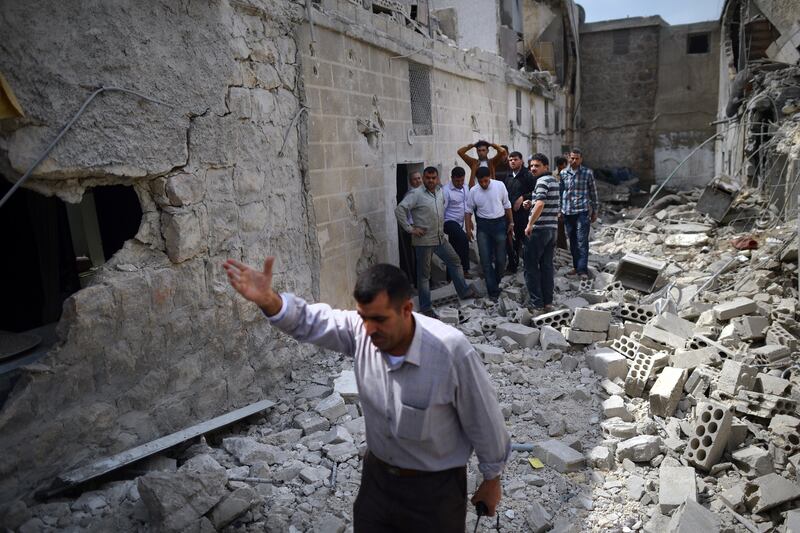Of course, we Americans think it’s horrible for any nation to use chemical weapons—except when we don’t. And of course, we want to punish any user of chemical weapons—except when we don’t. And of course, many now screaming against Syria’s likely use of chemical weapons against its rebels didn’t do much complaining when Iraq hurled these internationally banned gases against Iran and its own Kurdish people in the 1980s. And of course, American interventionists now demand U.S. military action against the Syrian government. But America’s history on chemical weapons is littered with mistakes and hypocrisy, and Syria itself is a bottomless pit of hatreds that can’t be “fixed” by more and more outside military force. And so, President Obama now correctly applies the brakes on further military action until the world knows for sure who did what, when, and how with these horrible gasses, and until he figures out what the U.S. can do that won’t make the situation worse.

Yes, Mr. Obama was wrong to declare Syria’s use of poison gases to be a “red line” that required U.S. military action. Presidents should say such things only when they’re absolutely sure they will act accordingly. He wasn’t sure and still isn’t. But he’s right to count to 10 now before he does something irretrievably stupid. We aren’t yet certain exactly what happened. We aren’t confident whether taking direct military action will bring the civil war to a speedier end or make it bloodier still. And we have no idea what we would do if initial U.S. military moves fail.
I should make clear at the outset that I’m flat opposed to the use of chemical, biological, or nuclear weapons. I’m also for responding strongly. But a country’s use of chemical weapons doesn’t give Washington license to do something stupid. If it made no sense for Washington to start arming the Syrian rebels before President Assad crossed the chemical-weapons line, U.S. arms for the rebels probably still isn’t justified today. Other preferable ways to respond—such as a cruise missile attack against Assad’s palace (in essence a warning shot)—wouldn’t commit Washington to further action without further cause.
ADVERTISEMENT
How to respond is no easy matter, and Americans have a way of forgetting history’s instructions; others don’t. Here’s some unpleasant history. The Geneva Protocol of 1925 banned the use of these weapons because of horrors during World War I. Italy employed chemicals against Abyssinia in 1935, and Japan against China in the run-up to, and early days of, World War II.
The United States used Agent Orange against the North Vietnamese (and in South Vietnam). Agent Orange is a chemical herbicide. Washington excused its employment on the grounds that U.S. forces used it for purposes of “deforestation” and not against people. Incidentally, it killed and injured many, perhaps half a million of them. We’ve flushed memories of this incident aside; others remember it well.
Then there’s the little matter of America’s great ally in the 1980s, Saddam Hussein, depositing chemical bombs and artillery shells upon human waves of Iranians who were overrunning Iraqi troops in a war that Iraq started. Estimates of how many Iranians were killed by Saddam’s chemicals alone range from 50 to 100,000. What did the Reagan administration do about this? After Saddam’s first mustard gas attacks, Reagan dispatched special envoy Donald Rumsfeld to Baghdad to cement closer ties with the dictator. The Reagan entourage committed a further moral outrage following Saddam’s use of chemicals against the Kurdish rebels in Halabja in 1988, during the closing days of the Iran-Iraq War. Nearly 7,000 Kurds were killed, and thousands more severely wounded, the vast majority of them civilians. Washington’s response was to try and place the blame for Halabja on Iran.
Throughout the war, the Reagan team blocked United Nations action against Iraq. After Halabja, it took seven weeks of back and forth before the U.S. finally agreed to a Security Council resolution condemning “the continued use of chemical weapons in the conflict between Iran and Iraq” and expecting “both sides to refrain from the future use of chemical weapons in accordance with their obligations under the Geneva Protocol.” In other words, the resolution implicated Iran as well as Iraq, even though no evidence was produced proving Tehran’s culpability.
Let’s face facts. Our nation’s leaders wanted Iran’s defeat and were prepared to accept almost any behavior by Saddam that furthered that goal. Even a truly ethical leader like the U.S. secretary of state at that time, George Shultz, admitted years later, “It’s a very hard balance. They’re using chemical weapons, so you want them to stop using the chemical weapons. At the same time, you don’t want to see Iran win the war.” Think about that kind of honesty regarding Syria.
Where were the congressional voices declaiming Saddam at that time? Was it alright for our ally Saddam to massacre his rebels with chemicals, but not OK for Assad? You betcha!
And I’m sure you wouldn’t be shocked that Iranians and Assadniks remember this history very well. I certainly don’t want Tehran to acquire nuclear weapons, but I also don’t lose sight of the fact that when Iranians think about developing nukes, they likely recall well how Americans were prepared to support the use of weapons of mass destruction against them.
If the United States and its friends truly wish to establish a consistent and viable standard on chemical weapons, they had better be very mindful of this hypocritical history and be extremely careful from now on. We haven’t got much credibility on this subject, save in our own eyes. So, President Obama does right by making every effort to substantiate the charges against Assad. I believe Assad is probably guilty of the crime, but history shows that evidence could pop up a year or so hence that the jihadi rebels planted the chemicals to foment Western military action against Damascus.
The screamers for U.S. military intervention are gaining traction. They always do when bad guys do bad things. But the real issue is what the United States can reasonably do about the horrors in Syria. To hold off this new drumbeat toward another U.S. war in the Middle East, Mr. Obama is right to set aside his automatic “red line” and substitute a new standard that calls for proof of “systematic” use of chemical gases. This “flashing yellow line,” however, won’t stop the hordes for long. It’s not enough to keep saying “wait,” try negotiations, and do a little more of this and a little more of that. He has to publicly chart a far more plausible policy that shows what we can and can’t do.





